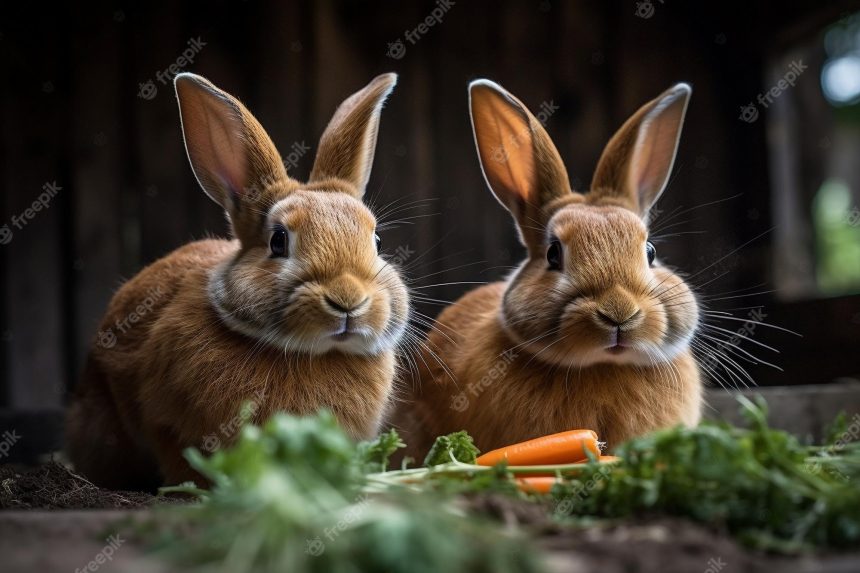
Introduction
When it comes to keeping your pet rabbit healthy and happy, a well-balanced diet is essential. Just like humans, rabbits have specific dietary needs that must be met to ensure their well-being. In this comprehensive guide, we will provide you with a printable rabbit diet chart that covers everything you need to know to provide the best nutrition for your furry friend.
Understanding Your Rabbit’s Dietary Needs
Rabbits are herbivores, which means their diet should consist primarily of plant-based foods. But what specific nutrients do they need to thrive?
Why Diet Matters for Rabbits
A rabbit’s diet is not just about filling their bellies; it’s about ensuring they lead a long and healthy life. A well-balanced diet can prevent various health issues, such as obesity and dental problems, which are common in rabbits.
Key Nutrients for Rabbits
- Fiber: Essential for proper digestion and preventing gastrointestinal issues.
- Protein: Important for growth and maintaining muscle mass.
- Vitamins: Including A, D, and E for overall health.
- Minerals: Such as calcium and phosphorus for strong bones.
Now that we’ve covered the basics, let’s delve into the core components of a rabbit’s diet.
Hay: The Foundation of a Rabbit’s Diet
Types of Hay
Rabbits should have access to two main types of hay:
- Timothy Hay: A high-fiber grass hay suitable for daily consumption.
- Alfalfa Hay: Best for young rabbits due to its higher protein and calcium content.
How Much Hay Does Your Rabbit Need?
A rabbit should have a constant supply of hay. They should consume an amount equivalent to the size of their body daily. Hay not only provides essential nutrients but also keeps their teeth healthy.
Fresh Vegetables: Adding Variety to the Diet
Safe Vegetables for Rabbits
Rabbits love fresh veggies. Some safe options include:
- Leafy Greens: Such as kale, romaine lettuce, and spinach.
- Carrots: A favorite treat, but offer in moderation.
- Bell Peppers: A good source of vitamin C.
Proper Serving Sizes
Ensure that vegetables make up only 10-15% of your rabbit’s diet. Too many veggies can upset their stomach.
Pellets: The Moderation Game
Choosing the Right Pellets
When selecting pellets, opt for high-quality brands with no added sugars or artificial colors. Look for those with a high fiber content.
Portion Control
Pellets should be a small part of your rabbit’s diet, around 1/8 cup per 5 pounds of body weight daily.
Fruits: Occasional Treats
Rabbit-Friendly Fruits
Fruits are a delightful occasional treat. Safe options include:
- Apples: Remove seeds and core.
- Bananas: A small slice will do.
- Berries: High in antioxidants.
Limitations on Fruit Consumption
Limit fruit intake to 1-2 tablespoons a day to avoid excess sugar.
Water: The Elixir of Life
Importance of Hydration
Fresh, clean water should always be available to your rabbit. Hydration is crucial for digestion and overall health.
Clean Water Sources
Regularly change your rabbit’s water and provide it in a heavy, non-tippable bowl.
Avoiding Harmful Foods
Foods to Never Feed Your Rabbit
Certain foods can be harmful to rabbits:
- Chocolate: Toxic to rabbits.
- Caffeinated Beverages: Such as tea or coffee.
- Processed Foods: High in sugar and unhealthy.
Toxic Plants to Watch Out For
Ensure your rabbit doesn’t nibble on plants like azaleas, rhododendrons, or lilies, which are poisonous.
Creating a Printable Rabbit Diet Chart
How to Structure Your Chart
A diet chart should include sections for hay, vegetables, pellets, and treats. Customize it with your rabbit’s preferences.
Customizing for Your Rabbit
Every rabbit is unique, so adjust the portions and choices based on their specific needs and tastes.
Mealtime Tips and Tricks
Establishing a Feeding Schedule
Consistency is key. Establish a regular feeding schedule to help your rabbit adapt.
Monitoring Your Rabbit’s Weight
Regularly weigh your rabbit to ensure they’re maintaining a healthy weight.
Common Diet-Related Health Issues
Obesity in Rabbits
Overfeeding and lack of exercise can lead to obesity. Monitor your rabbit’s weight and adjust their diet accordingly.
Gastrointestinal Stasis
A lack of fiber can cause gastrointestinal stasis, a severe condition. Ensure your rabbit gets enough hay to prevent this.
The Importance of Dental Health
Chewing and Dental Care
Rabbits’ teeth continuously grow. Chewing on hay and toys helps keep their teeth in check.
Signs of Dental Problems
Watch for signs like drooling, difficulty eating, or a reduced appetite, which may indicate dental issues.
Homemade Treats: A Little Extra Love
Safe DIY Treat Recipes
Consider making homemade treats using rabbit-safe ingredients. It’s a fun way to bond with your pet.
Exercise: Keeping Your Rabbit Fit
The Need for Exercise
Encourage your rabbit to move with toys and playtime outside of their hutch.
Interactive Playtime Ideas
Toys like tunnels, balls, and puzzles can keep your rabbit mentally and physically engaged.
Consulting with a Veterinarian
Regular Check-ups
Schedule regular vet visits to ensure your rabbit’s health is in top shape.
When to Seek Medical Attention
If you notice any concerning changes in your rabbit’s behavior or health, don’t hesitate to consult your veterinarian.
Conclusion: A Happy and Healthy Rabbit
In conclusion, a well-balanced diet is the cornerstone of your rabbit’s well-being. By providing the right mix of hay, vegetables, pellets, and occasional treats, along with ample exercise and dental care, you can ensure your furry friend lives a long and joyful life.
Now, let’s address some common questions about rabbit diets.
FAQs
- Can rabbits eat bread or pasta?
- No, these foods are too starchy and can upset your rabbit’s stomach.
- How can I encourage my rabbit to eat more hay?
- Offer a variety of hays, and ensure they always have access to it.
- Is it okay to feed my rabbit leafy greens every day?
- Yes, but ensure a diverse selection to provide a range of nutrients.
- What should I do if my rabbit becomes overweight?
- Consult your vet for a tailored diet and exercise plan.
- Are there any alternatives to pellets for rabbits?
- Yes, you can consult your vet for a pellet-free diet plan that suits your rabbit’s needs.
Remember, a happy rabbit is a healthy rabbit. Tailor their diet, keep them active, and show them lots of love for a life filled with bunny bliss.






